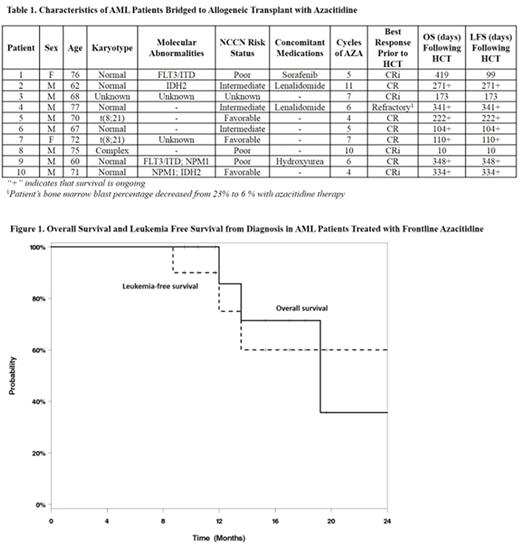Abstract
Introduction: Treatment with the hypomethylating agent (HMA) azacitidine (AZA) has become a standard treatment option for older acute myeloid leukemia (AML) patients thought unfit for standard induction chemotherapy with infusional cytarabine and an anthracycline. AZA is generally well-tolerated, and carefully selected AML patients who achieve complete remission (CR) with frontline HMA therapy may subsequently improve to become suitable candidates for reduced intensity conditioning (RIC) allogeneic hematopoietic cell transplantation (HCT) (Lübbert 2009). However, there are very limited data available regarding the use of AZA as a bridge to HCT in AML. The purpose of this study was to evaluate remission status and survival outcomes in patients treated with upfront AZA who undergo HCT.
Methods: All AML patients at our institution diagnosed between December 2015 and October 2016 who were initially deemed unfit for intensive chemotherapy and received frontline AZA as a direct bridge to HCT were included in this analysis. Remission statuses after AZA therapy, immediately before transplant, and following transplant were evaluated and categorized as CR, CR with incomplete platelet recovery (CRp), CR with incomplete hematologic recovery (CRi), refractory, or relapsed. Descriptive statistics were used for categorical and continuous variables. The Kaplan-Meier method estimated overall survival (OS) and leukemia-free survival (LFS).
Results: Ten patients treated with frontline AZA proceeded directly to HCT; by comparison, during the same period, 17 patients in this age range who received upfront AZA at our institution did not undergo HCT. Of those patients proceeding directly to HCT, there was a male predominance (80%), and median age at diagnosis was 70.5 years (range 60-77; Table 1). Of the 10 patients bridged to HCT, 3 were favorable risk by NCCN guidelines, 3 were intermediate risk, 3 were poor risk, and 1 had an unknown risk status. All patients received 75 mg/m2 of AZA administered daily intravenously on days 1-7 of a 28-day cycle, for a median of 6 cycles (range 4-11), without delays or dose reductions. Four patients received other chemotherapeutic agents concomitantly with azacitidine.
During AZA therapy, 5 patients achieved CR, 4 obtained CRi, and 1 was refractory (despite exhibiting a reduction in bone marrow blasts). All patients maintained their respective remission statuses following AZA therapy until immediately prior to HCT. Nine patients underwent haploidentical peripheral blood HCT, and 1 underwent matched related peripheral blood HCT. All patients received a RIC regimen consisting of fludarabine, cyclophosphamide, and total body irradiation as well as post-transplant cyclophosphamide. One patient died from septic shock early during his transplant admission and was included in survival analyses but did not undergo post-HCT disease assessment. At their first disease assessment following HCT, 3 patients achieved CR, 3 obtained CRp, 2 exhibited CRi, and 1 had relapsed. For the aggregate patient cohort, Kaplan-Meier analyses revealed a 1-year OS rate of 86% and a 1-year LFS rate of 75% (Figure 1). Median OS was 19.2 months (95% CI [12.0, N/A]), and median LFS was not reached during the study. Median follow-up time from diagnosis was 14.5 months (range 9.6-19.7).
Conclusions: Treatment with AZA was well-tolerated and adequately effective to yield remissions in an older patient population that typically experiences poor outcomes with intensive chemotherapy. Such patients may sufficiently improve while in remission to then proceed with HCT. Frontline AZA can thus be used as a successful bridge to HCT in selected elderly AML patients who were originally considered unfit for standard induction. These results require validation in a larger cohort.
Grunwald: Incyte: Consultancy, Research Funding; Genentech: Research Funding; Alexion: Consultancy; Pfizer: Consultancy; Amgen: Consultancy, Research Funding; Forma Therapeutics: Research Funding; Celgene: Consultancy; ARIAD: Consultancy; Cardinal Health: Consultancy; Janssen: Research Funding. Trivedi: Pharmacyclics: Consultancy, Honoraria.
Author notes
Asterisk with author names denotes non-ASH members.


This feature is available to Subscribers Only
Sign In or Create an Account Close Modal